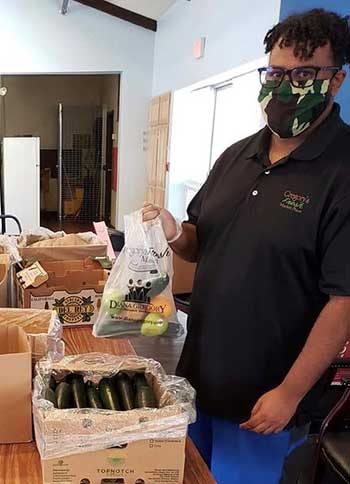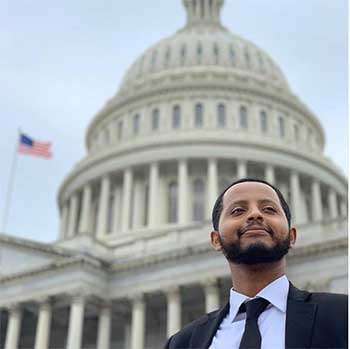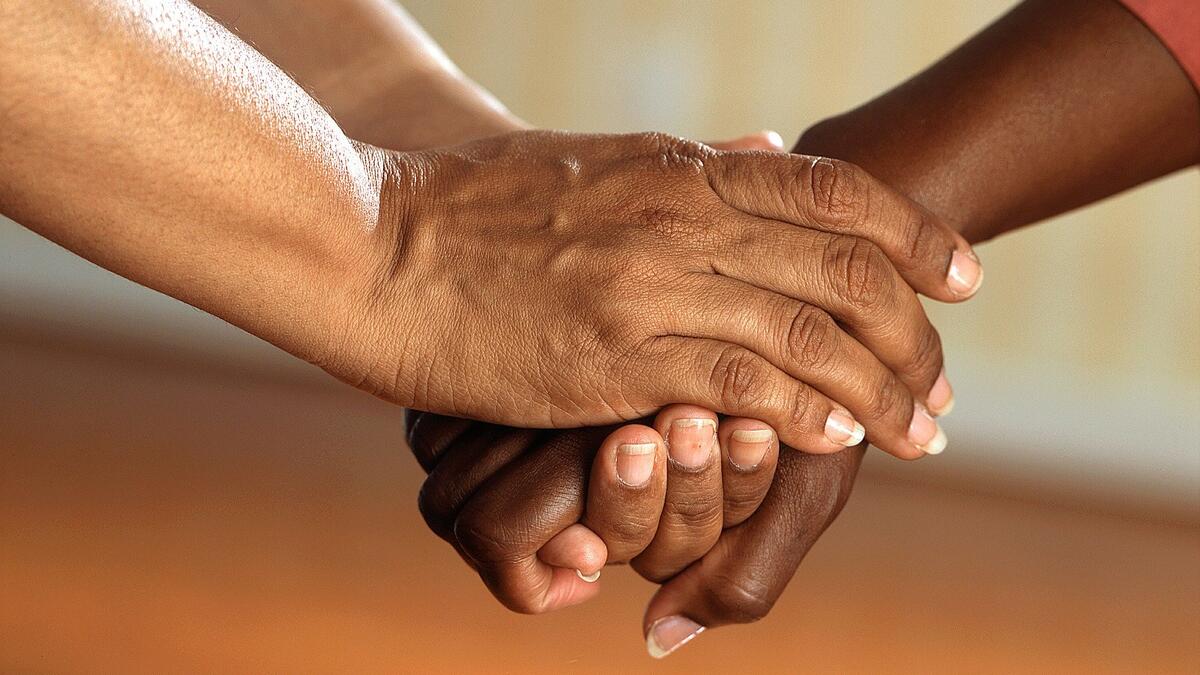Students at Arizona State University have access to dozens of programs that allow them to help people in the community, in Arizona, across the U.S. and around the world.
But how can people do public service work when almost everything has gone virtual, thanks to the COVID-19 pandemic?
Several humanitarian initiatives in the ASU community have become creative in making the switch to helping people remotely or with social distancing. And in some cases, the change has allowed more people to benefit.
Ruben Neal has been working with Diana Gregory Outreach Services, a Phoenix-based organization that provides fresh fruits and vegetables along with nutrition education to low-income older adults and veterans. Before the pandemic hit, the nonprofit held farmers markets to distribute produce.

Ruben Neal, a member of Public Allies Arizona, based at ASU, packed and delivered 3,000 bags of produce to low-income older adults and veterans. Photo courtesy of Ruben Neal
“But then we went to a whole new model. The idea came into my head when I saw all the restaurants doing delivery,” said Neal, a student at Colorado Technical University. He worked with Gregory to pack and deliver more than 3,000 bags of fruit and vegetables to older adults and veterans in the Phoenix area.
“We actually ended up helping a lot more people via this model,” he said.
Neal is in Public Allies Arizona, an intense, full-time AmeriCorps apprenticeship program that pairs young people with nonprofit organizations. The allies are paid for their work over the 10-month period and then receive a grant to pay for tuition, professional development or to apply to student debt. Public Allies is part of the ASU Lodestar Center for Philanthropy and Nonprofit Innovation, in the School of Community Resources and Development.
Many of the Public Allies already did some digital work, helping their nonprofits with social media. Neal started making videos for the Diana Gregory Outreach Services Instagram and hugely increased the number of followers.
The 26 young people in the current Public Allies cohort, based in Phoenix and Tucson, made the switch to virtual work in different ways depending on the needs of the nonprofit, according to Jacob Teskey, director of the Public Allies program.
“Our partner organizations all have their own protocols and standards we’ve been navigating,” he said.
“We’ve worked to create telecommuting or remote work plans, and their service projects have had to evolve with the circumstances, but everyone has taken the initiative to say, ‘OK, let’s figure this out.’”
For example, one member's service project changed to include creating a team to assess the impact of COVID-19 on homeless people. Another’s job was to recruit volunteers, so she created a “virtual volunteer” process.
The allies also complete a curriculum that teaches leadership and professional development skills. Typically, the group gathers one day a week to do that work, but over the past few months, it’s been on Zoom.
“It’s hard to sit in front of a computer for eight hours and we understand that,” Teskey said. “So we’ve had to be creative in what those days look like. The allies can leave and work on assignments and come back.”
Some of the allies were able to do some work in person. Kyah Recard is a Public Ally working as a program specialist with the Boys and Girls Clubs of the Valley, whose locations have largely have remained open.
“I began in the office, reading data points and making my own spreadsheets, and I also was making highlights of what was going on in the clubs,” said Recard, who will be a sophomore at ASU this fall, majoring in family and human development.
Working from home allowed Recard to tackle the kind of important projects that always seem to get put off.
“At home, I began a new project where I sorted all the of the employees in our organization and I organized their CPR and first aid certificates — who from what club was certified and if they’re not, when they’re doing it,” said Recard, who’s living with her family in Buckeye, Arizona, this summer.
But the Boys and Girls Clubs locations became busy, so Recard started helping out the staff at the Avondale site, even as she continued to take 18 credits during the spring semester.
“The staff all wore masks and enforced distancing and we were making sure we washed our hands,” she said. “And we were disinfecting the toys.”
The experience has opened her eyes to the world of public service.
“For a career, I want to work with kids and (create) a better future for children who are going through family issues,” she said.
‘They know the realities’
One nonprofit organization based at ASU has been able to leverage the enthusiasm of humanitarian workers who were displaced when the pandemic hit. In March, the Peace Corps brought more than 7,000 volunteers around the world back to the United States.
That presented an opportunity for Laura Hosman, an associate professor in the School for the Future of Innovation in Society at ASU and the inventor of SolarSPELL, a solar-powered library that fits into a backpack. Over the past few years, the SolarSPELL initiative has distributed hundreds of digital libraries filled with educational resources to remote communities in nine countries that have limited or no internet connectivity.
The true value of SolarSPELL is the carefully curated content. Each memory card holds reading and math tutorials, science projects, health information or English lessons that are chosen specifically for each location. The content can be drawn from open-source text and videos that are available for free on the internet or taken from textbooks that are used with permission.
Hosman is hoping to greatly expand the use of SolarSPELL around the world, and to do that, the devices must have libraries of information that are relevant to local communities.
When she learned about the recently returned Peace Corps people, many of whom are staying at home and eager to contribute, Hosman launched the Help from Home initiative, in which the returnees can volunteer to collect content for SolarSPELL libraries.
“All these volunteers are at home looking for quality opportunities,” she said.
“They are the content specialists and they know the realities on the ground and they have a heart that’s bleeding for the communities they left.”
Courtney Finkbeiner, who served in the Peace Corps in Fiji and returned last fall, is leading the effort for SolarSPELL. She used the devices in her community in Fiji and is now working with about a dozen returned volunteers in the Valley on Help from Home.
“There are a lot of benefits for all parties involved,” she said. “It’s not just about curating content for libraries, although that’s a big part because we believe, with their field experience, they’re highly aware of what the needs are.”
Help from Home also will increase exposure for SolarSPELL as the nonprofit seeks to expand around the world.
“The biggest draw for me in working with SolarSPELL is that I’ve lived it and I worked with it and I’ve seen the challenges and I’ve seen the success and the potential,” Finkbeiner said.
Backyard science
Every year, many ASU students are selected to participate in prestigious fellowship opportunities in the U.S. and abroad. Some of those programs have been suspended due to the pandemic, but others have transitioned to work virtually.
Tahiry Langrand, a sustainability major at ASU, was selected for the Doris Duke Conservation Scholars Program, a highly selective two-year award to pursue coursework and research leading to careers in environmental conservation.
Langrand was supposed to spending this summer at the University of California at Santa Cruz completing eight weeks of intensive field science. Instead, he’s staying with his family in Virginia and doing online coursework. The curriculum includes a synchronous class, small-group projects and storytelling exercises.
And instead of being trained to do field work in California, the scholars are doing it in their own locations.
“I go on the trails around my house and in the woods and observe nature and do science locally,” he said.
“Even though it’s on our own, it’s guided.”
The second summer of the program is supposed to be an internship, but instead, Langrand and the other scholars will do the fieldwork sessions they missed this year.
“I’m very busy and it’s still a great experience,” Langrand said. “They put a lot of effort and thinking into designing this.”

Hussein Mohamed, a grad student at ASU, is delaying his trip to Ghana and is now doing immersive language study as a Boren Award winner. Photo courtesy of Hussein Mohamed
Hussein Mohamed, a graduate student studying social justice and human rights at ASU’s West campus, is one of seven Sun Devils chosen for a Boren Award. That fellowship is sponsored by the U.S. National Security Education Program to build a more qualified pool of Americans with foreign language and international skills through linguistic and cultural immersion.
“In my studies and what I’m passionate about is human trafficking and the terror funding nexus,” Mohamed said.
“For myself, that means studying the vernacular language of Akan Twi in Ghana, West Africa, where there are a lot of national security interests.”
Originally, Mohamed was supposed to travel to Washington, D.C., this summer for an orientation with all the Boren Fellows nationwide, then go on to the University of Florida for language immersion. After that, he was scheduled to go to Ghana in August for nine months.
But the pandemic upended the program. Now, he is doing five and half hours of language immersion classes remotely every day, with plans to travel to Ghana in January 2021.
Mohamed said the flexibility of the program was key. When he found out he would be staying in Arizona, he had to renew his lease, and he was able to get funding from Boren to do that.
He’ll also use the delay to improve the experience once he gets to Ghana.
“Of course, I wish coronavirus never existed and I was in Florida right now because I think I would have more focus on my program,” he said.
“I still have to balance family life and school life and work life. But now I have more time to think about the research project I’ll implement when I’m in Ghana and I can do all the pre-work in the fall.”
Mohamed already spent time in Ghana as a Fulbright student scholar, but he really started on the track toward humanitarian work after he studied abroad in Morocco as a Gilman Scholar while he was an undergrad at ASU.
“That five-week experience ignited this passion and I want to continue this international work,” he said. “This is the path that was calling me.”
Top image courtesy of Pixabay.
More Arts, humanities and education

Behind the curtain: Discovering careers in the arts at ASU Gammage
For a group of students from Sunnyslope High School, Eastmark High School and AZ Teen Homeschool Co-op, a recent December day at ASU Gammage became much more than just a field trip. It became an eye-…

Honoring a legacy of cultural education, exploration
Belle Edson has inspired countless students to expand their horizons during her 26-year tenure at Arizona State University. A beloved professor and director of undergraduate studies and core courses…

School of Social Work’s ‘keepin’ it REAL’ substance use prevention program to expand across Sonora this spring
More than 7,000 seventh graders in the Mexican state of Sonora will enroll this spring in an Arizona State University program that has been teaching how to prevent substance use to thousands of…
